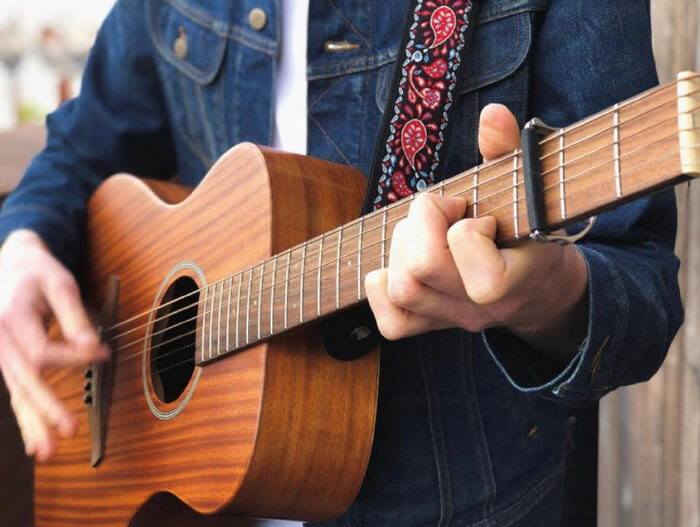Dm will certainly come in handy as you progress. In this video, Justin demonstrates the proper fretting, compares it to D major, and helps you find your comfort zone when playing it.
BEGINNER ACOUSTIC GUITAR LESSON 21
MAKING YOUR PRACTICE
SESSION MOST EFFECTIVE
By Matt Smith
One of the most common questions I'm asked at master classes is how and what to practice. The eight most important skills needed to be a great musician are (in no particular order): ear training; scale and chord knowledge; composition; reading and writing chord charts and notation; repertoire; technique; music theory; and improvisation.
1: Ear Training
The skill of understanding what you're hearing and how to play it on your instrument. This skill is probably the most important skill you'll need as you develop your abilities on your instrument. Start very simply with easy songs you've heard many times. Slowly build in complexity as you develop. A big hint — sing everything you play. Making the connection between your speech center and your instrument will help you immeasurably in this endeavor.
2: Learn New Scales And Chord Forms
These are the fundamental building blocks of your foundation as a player.
Study chord forms by grouping them into categories. For example, learn as many positions as you can of the four triads, major, minor, diminished, and augmented chords. Then move onto the 7th chord family —maj7, minor7, dominant7 and minor7b5 (sometimes called half diminished). Learn these forms with roots on the 6th, 5th, and 4th strings, as these are the most common forms.
There are a lot of scale forms to learn also — major and minor pentatonic scales, modes of the major scale, as well as modes of the melodic minor scale and altered scales. A well-rounded musician has a grasp of the forms and usage of these scales and the various positions of each. A good place to start is to root each scale again on the 6th, 5th, and 4th strings.
3: Composition
Any artist is represented by his or her body of work. Composing is a skill that musicians should place great importance on. It's what represents and immortalizes us. As a teacher, I've always stressed the importance of using newly learned skills as a springboard for writing. It gives focus to the practice routine and makes learning new ideas fun. Everything you've learned or are learning should be brought into play when writing. Try and compose at least a song a week. Before you know it, you'll have enough songs to record an album!
4: Reading and Writing Notation and Chord Charts
This skill is absolutely necessary for musicians to master. It's how we communicate with one another. Being able to walk into a room of musicians with clear, well written music and/or charts is essential for communicating exactly how you want your music to be played.
As a teacher, this skill is as easy as breathing. To a student, it can be intimidating. Try transcribing your original compositions or familiar songs. Chart out songs and try them out with your band mates. Syncopation is the toughest skill to write, so get your reading sharp. Getting good at this with familiar music is the easiest way of developing your writing ability.
5: Repertoire
To become competent in a particular style, one must study the greats of the genre. If you want to sit in at the good sessions in town, go check out what tunes are called. Every genre has its classics and master musicians. Learn the best songs of the style.
Another aspect of repertoire is what you choose to play in performance. You should strive to educate your audience as well as entertain them. Every genre has its overplayed tunes. Watching what other successful musicians are playing is a good way to learn what goes over. A well-rounded musician is proficient in a number of genres. Learning new material keeps you and your audience sharp.
6: Technique
It's pretty easy to reach a certain level of ability and feel comfortable there — it's also ultimately unsatisfying. We all have a "default" ability that we rely on when performing. The key is to raise your default by regularly advancing your technique.
Learning proper hand position and posture can help alleviate a lot of playing related issues. Right and left-hand exercises are a part of a good practice regimen. As guitarists, we tend to focus on the left hand, but your right hand is just as important. Find exercises you enjoy doing. Exercises that require repetition to develop dexterity are more enjoyable while catching up on the latest episode of a favorite show. Repetition is the mother of skill.

7: Music Theory
If you're going to move to Italy, it's a really good idea to become fluent in the Italian language. As musicians, we communicate our thoughts to one another in very specific ways. Concerning music theory, everything relates to notes of a major scale or chords of a key.
If I'm at a gig and the bandleader says, "It's a 1,6,2,5," I know he's referring to the first, sixth, second, and fifth chords of the major key we're playing in. If a musician asks me to resolve a phrase on the flat 3, I know he means the flattened third note of the major scale.
The major scale isn't rocket science. Just remember whole, whole, half, whole, whole, whole, half. Every note in the musical alphabet is represented in every scale, and if you remember these two rules, it's super easy:
- Never skip a letter
- Never use the same letter twice
Remember, all music theory is based on the major scale! Learn to read and write music. Learn to read and write chord charts and lead sheets. When working with great musicians, you'll earn respect. Start writing chord charts to easy songs you know well and work up to difficult pieces.
8: Improvisation
Great improvisers play streams of melody, not "licks." Unless you're a horn player, sing along with everything you improvise. We communicate with speech and tying your instrument to your voice will help on so many levels.
We all hear what we want to play in our heads, but it often doesn't come out when we play. We don't feel in control of our instrument. Singing with your instrument gives you a great frame of reference for achieving what you're hearing others play and developing your spontaneous composition ability.
Some other great tools are:
- Singing what you want to play before executing it on your instrument.
- Imagine you're playing in the style of another instrument (playing sax lines on the guitar, etc.)
- Playing in the style of various masters of your instrument (if you're a jazz trumpet player, how would Miles play over this? How would Louis Armstrong solo over this?). You get the idea.
Remember to play with other musicians every chance you get. There are skills learned in live performance that can only be achieved this way. Also, please remember that it’s “playing” music. Have fun. The joy is in the journey.





